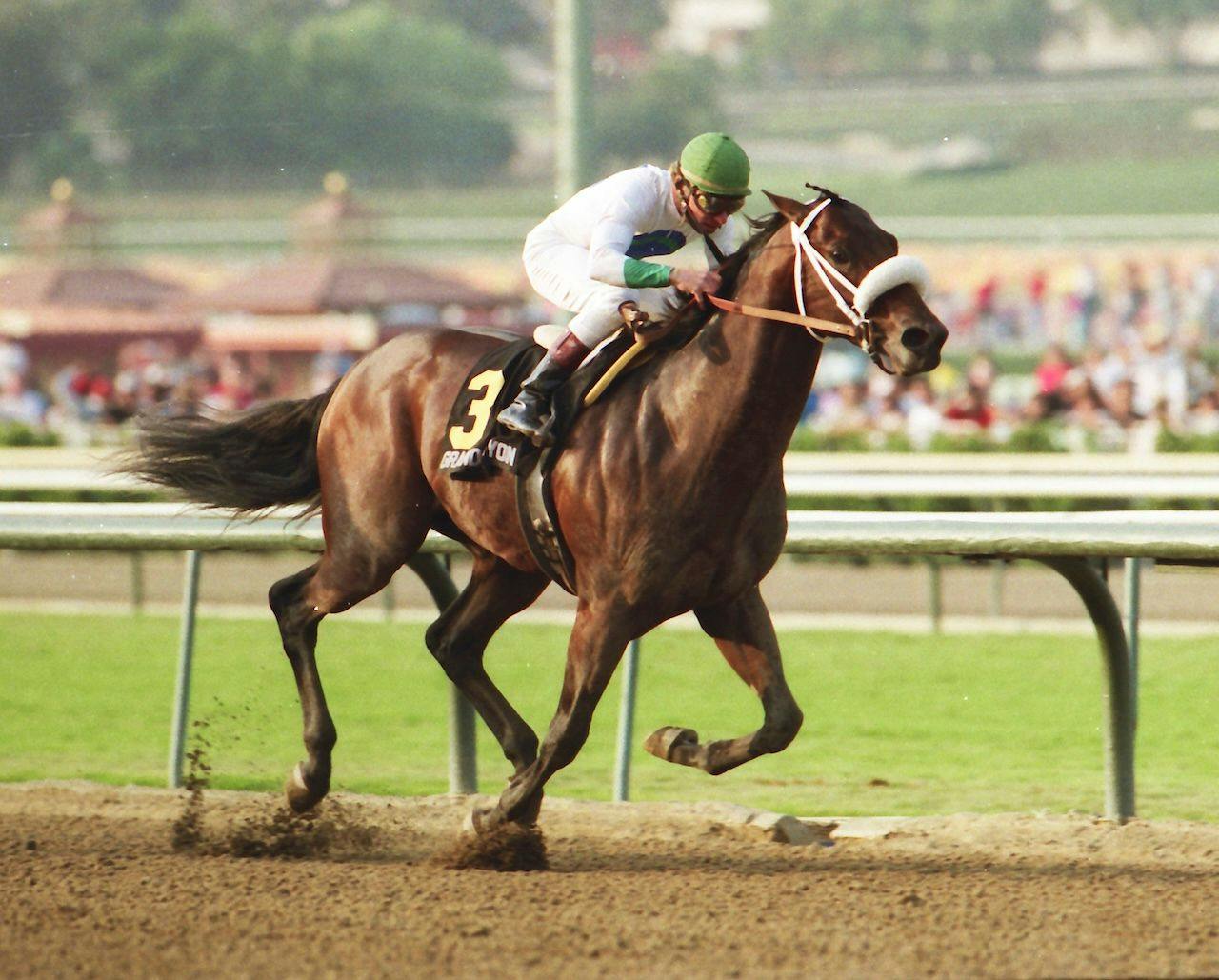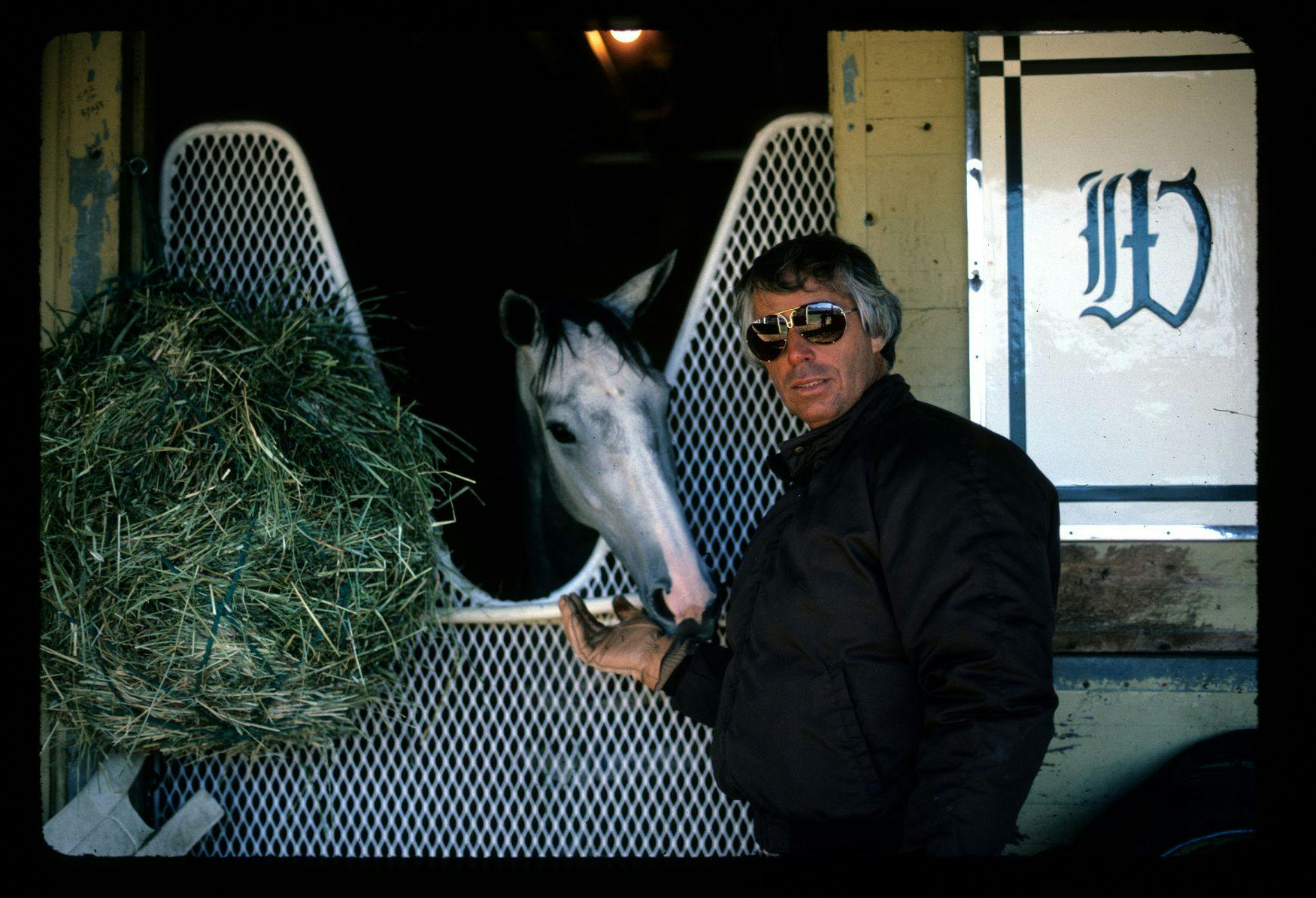D. Wayne Lukas: One horse that could have been his best

Grand Canyon wins the Oak Tree's Norfolk Stakes.(Photo by Four Footed Fotos)
When I succumbed to the allure of Thoroughbred racing nearly 40 years ago, trainer D. Wayne Lukas was already one of the sport's human superstars. By then, Lukas was a decade into transforming not only his own profession but the image of racing at a time when coverage had become more widespread on both network and cable television.
I can't pinpoint exactly when his name first entered my brain, but his ubiquitous presence made him impossible to ignore. It must have been the summer of 1986 when ESPN came to my backyard to broadcast the Saint Paul Derby from Canterbury Downs. It was a one-hour telecast I re-watched on videotape countless times before my 10th birthday.
Donning a checkered sport coat and his trademark sunglasses on an overcast afternoon, Lukas was interviewed by Dave Johnson in the paddock about his Saint Paul Derby entrant, Clear Choice.
"You know, Dave, if they're putting up $300,000 we'll be showing up even if it were in Tokyo," Lukas said. As I came to learn, it was a quintessential Lukas statement of the era. All of them, really, as it basically summed up his modus operandi.

Alas, for Clear Choice, the Saint Paul Derby proved a disaster as he finished last of 12, beaten 36 lengths. Undeterred, Lukas entered Clear Choice in the Swaps (G1) at Hollywood Park three weeks later, and somehow the speedy colt still had his neck in front at the wire after 1 1/4 miles.
That was vintage Lukas, as was the fact that Clear Choice was still only halfway through a grueling 20-start campaign.
It's amazing to recall, but Lukas' far-flung operation once included a string at Canterbury, under the direction of longtime assistant Randy Bradshaw. But then again, Jack Van Berg, Bill Mott, and Carl Nafzger were around there at the time, too. The Lukas stable won 32 races during Canterbury's 1986 season, falling short of the meet title by two wins.
The first time I ever had a chance to speak with Lukas was as a college student, at a reception following his acceptance of the University of Louisville's John W. Galbreath Award in 1998. In awe of the legend, I had the gumption to ask only one question, about his single season in Minnesota.
In so many words, Lukas explained his presence as more or less a favor to the Santa Anita-affiliated racing office at Canterbury. He also didn't mince words about his concurrent skepticism regarding Canterbury's financial viability. Lukas recalled telling the Santa Anita crew that a wide swath of the Minnesota populace were not natural gamblers, and if they were, then only of the $2 variety.
A native of neighboring Wisconsin, specifically the small town of Antigo, Lukas was well-acquainted with the cultural attitudes of Upper Midwesterners at the time. And admittedly spot on.
I didn't speak with Lukas again until many years later, at Oaklawn Park, and then only briefly. In a less rushed setting, though, I would have asked him to reflect on one specific horse, a budding superstar who didn't have the opportunity to show the full extent of his talents.
About an hour before Sunday Silence and Easy Goer had their final, epic clash in the 1989 Breeders' Cup Classic (G1) at Gulfstream Park, the Lukas-trained Grand Canyon took a scenic route in the Breeders' Cup Juvenile (G1) and finished second by two lengths to the rail-skimming Rhythm. Losing the Juvenile is usually tantamount to losing the Eclipse Award, which Grand Canyon did but arguably shouldn't have.
The Breeders' Cup Juvenile was the only stakes victory achieved by Rhythm that year. Grand Canyon was more prolific, capturing the Norfolk (G1) in advance of the Breeders' Cup and the Kentucky Jockey Club (G3) and Hollywood Futurity (G1) afterward.
A son of Fappiano, Grand Canyon fetched $825,000 as a yearling by longtime Lukas client William T. Young. Although he raced in Young's Overbrook Farm silks, Lukas owned a significant share in the physically imposing colt, with reports ranging from 25 to 35%.
"When I bring him in a paddock, no one can believe he's a two-year-old," Lukas told legendary Los Angeles Times columnist Jim Murray. "He's massive. He weighs over 1,200 pounds. He's all business. He's like [Mike] Tyson."
Although Grand Canyon had displayed immaturity winning the Norfolk, he proved an absolute beast winning the Kentucky Jockey Club by 10 lengths and the Hollywood Futurity by 6 1/2 lengths, the latter in a time of 1:33 for one mile. That clocking shattered champion Snow Chief's stakes record by more than a second and was the fastest mile ever run by a two-year-old. Grand Canyon was assigned a 106 Beyer Speed Figure, which, at the time, were exclusive to Bloodstock Research Information Services (now Brisnet.com) subscribers.
Because the Futurity was run that year on Dec. 17, the race was not included in the past performance packet sent to Eclipse Award voters earlier that month in those pre-Internet days. Rhythm prevailed in what was the closest divisional race on the ballot that year.
"It's like voting for the national champion of football before all the games are finished," Lukas said of the decision.
Despite attracting fewer votes than Rhythm, Grand Canyon entered 1990 as the future book favorite for the Kentucky Derby (G1). However, a physical issue that surfaced while Grand Canyon was pulling up in the Futurity flared up in the ensuing weeks.
In early February, after a half-mile workout, veterinarians diagnosed Grand Canyon with strained flexor muscles near his left knee. His time on the bench was going to be a minimum of four months, ruling out participation in the entire Triple Crown series.
Grand Canyon sadly never returned to the races, nor did he survive the summer. While stabled at the Del Rayo Training Center in Rancho Santa Fe, Calif., in early July, Grand Canyon suffered a ruptured blood vessel in his right foreleg. Laminitis soon set in, and Grand Canyon had to be put down.
"Grand Canyon was a horse capable of taking us to new levels," Lukas said.
D. Wayne Lukas consistently reached new levels, sometimes many times over, but a few of us will always remember Grand Canyon as the player who might have defined the coach's entire career.

Grand Canyon wins the Oak Tree's Norfolk Stakes.(Photo by Four Footed Fotos)



